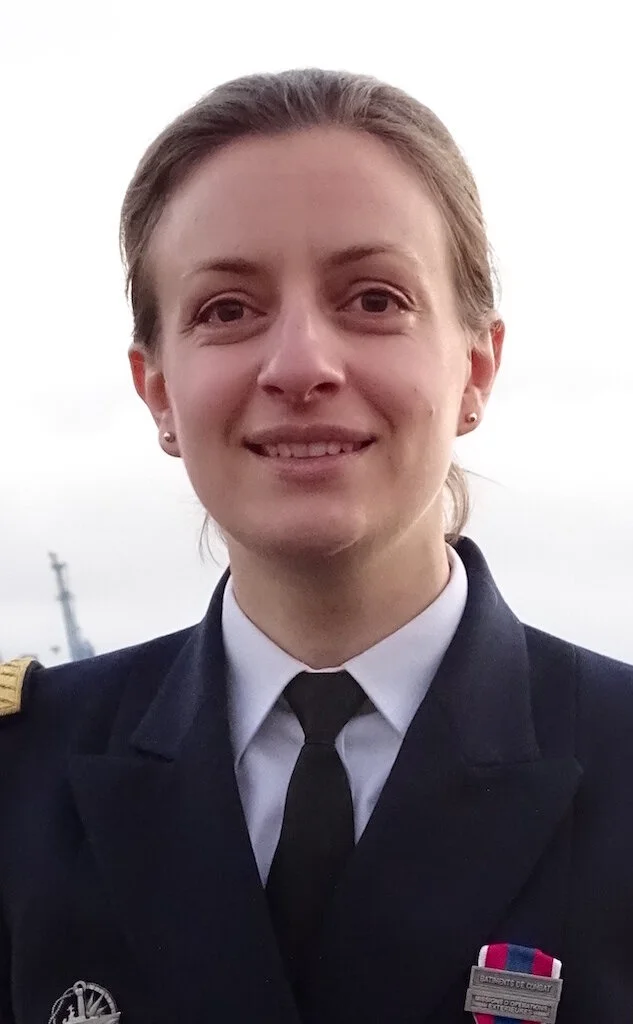Lieutenant Laura
Lt. Laura
Laura will never have anything to do with the French nuclear deterrent force because she holds dual French/Lebanese nationality. But apart from that her bi-nationality, which “is fairly atypical” amongst officers in the French Navy, should not hinder her career, she tells me during our WhatsApp video call a few days before she goes back to sea as captain of the Laplace hydrographic vessel.
Laura's mother is French, her father Lebanese. She and her sister grew up in Saida, about 45 kms south of Beirut along the coast. “I lived in Lebanon through the 1990s and up to 2005 and during much of that time the country was at war. So I have personal experience of the other side of conflict, the civilian side,” she explains soberly. And this gives her a slightly different outlook from her French officer colleagues. “I think I know what I'm getting involved in and am conscious of the consequences of my acts when weapons are used,” she says, adding that “I'm not more legitimate but I probably do have a different point of view … which is not necessarily better.”
Nobody in her family of architects, lawyers and pharmacists was connected with the armed forces in either Lebanon or France so her parents thought her ambition to join the navy was a passing teenage whim. “They only really cottoned on that I was serious when I was accepted at the Naval College,” she smiles.
““ I wanted to command men””
Laura explains that Lebanon is an Oriental country and “a little misogynist” which “I've always refused to abide by.” In addition when she left school in 2005 “you had to be very well connected and know which strings to pull in order to get any type of decent job whether you were male or female.” She could have opted to join the Lebanese armed forces “but operational posts are closed to women. I wanted to command men, so that's why I opted to join the French armed forces,” she says.
She did not consider joining the army “because although I'm sporty I don't have the physical power for it”; the air force was out “because you are either in the air or on the ground so the choice of professions is limited”, but the navy offered “a huge scope of jobs.” A ship, she remarks, is like a village where professions ranging from cook to doctor, from engine mechanic to radar specialist are vital “and so even though my only knowledge of the navy was from magazines, I decided that that's where I wanted to be.”
She was 18 when she left Lebanon with two baccalaureates under her belt (the French one which she passed as an independent student and the Lebanese one which she did at school) to stay with her grandparents near Paris for two years doing “very little else but preparing for the competitive entry exams to get into the most prestigious institutions of higher learning which include the various military colleges.” Fortunately for her she got into the Naval College “because although I did have a vague plan B to go to engineering school it would have been a real let-down if I'd had to do that.”
Laura is unsurprised that there were only a dozen or so girls in her class of about 80 at the Naval College in Brittany. She thinks young women often have a skewed image of what the armed forces are all about and believes that young women have an advantage in that “human relations seem much more simple with a woman and even more so when you're a mother,” she remarks (she has a 4-yr old son). “I think we enable people to drop their masks and talk more freely than they would to a man.” As captain of her ship she has had tears in her office from young men who'd been beaten in childhood by alcoholic fathers and from others whose couple needed fertility treatment to have children. “And, without revealing anyone's identity, I can offload too much emotion to my parents and my husband because one has to learn not to keep things bottled up oneself,” she says.
Her husband is also in the navy “so is familiar with the job.” She explains that once a navy couple has children the administration always ensures that at least one of the parents has a land-based job. “So we've arranged it that when my sea-based mission ends this summer then my husband will go to sea and I'll be land-based and care for our son and the second child we hope to have.” She admits though that her son “punishes” her when she comes home by “not wanting me to read the bedtime story for a few nights but my husband will suffer the same punishment when he comes home from mission!”
When she joined the navy she specialised in surface warfare and artillery “but the Navy wants officers to be very versatile so you don't stay in your speciality for very long.” In her case it was four years. Despite the training she was apprehensive the first day as captain of a ship. “Will I be able to cope?” she wondered. “It's not like driving on a road: there are no marks to follow and you have to take into account many variables such as the currents, the winds, the tides.” But that is clearly a large part of the attraction for her. “I fell in love with the sea!” she grins.




